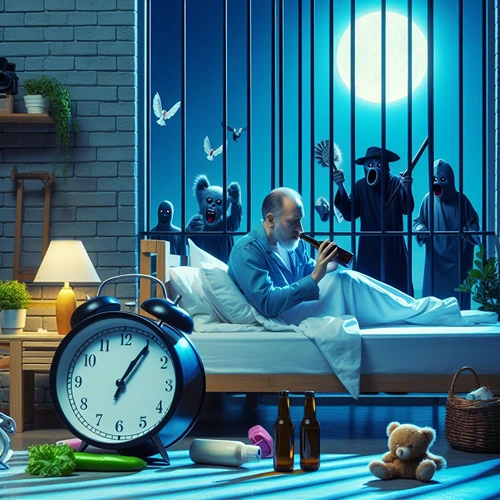In the modern age, where the lines between work, leisure, and personal time often blur, the habit of staying up late has become increasingly prevalent. Yet, beyond the immediate effects of fatigue, the repercussions on mental health caused by consistently burning the midnight oil are profound and multifaceted.
Sleep is a fundamental pillar of mental well-being, playing a crucial role in cognitive functions, emotional regulation, and overall mental health. Chronic sleep deprivation resulting from staying up late disrupts the body’s natural sleep-wake cycle, impacting mood, cognition, and psychological resilience.
One of the most significant dangers of insufficient sleep on mental health is its contribution to mood disorders. Research has linked inadequate sleep to increased irritability, anxiety, and depression. Sleep deprivation alters neurotransmitter levels in the brain, affecting the regulation of emotions and amplifying negative feelings, making individuals more prone to mood swings and heightened stress responses.
Moreover, staying up late can exacerbate existing mental health conditions. Individuals dealing with anxiety or depression often experience sleep disturbances, and irregular sleep patterns can worsen these symptoms. The lack of quality sleep hampers the brain’s ability to process emotions and cope with stressors effectively, intensifying feelings of despair or unease.
Cognitive function is also profoundly affected by sleep deprivation. Concentration, problem-solving abilities, and decision-making skills are compromised when the brain is deprived of adequate rest. This impacts productivity, academic performance, and daily functioning, leading to increased frustration and decreased self-esteem.
Furthermore, chronic sleep deficiency has been associated with a higher risk of developing serious mental health conditions over time, such as bipolar disorder and schizophrenia. While sleep disruption might not be the sole cause, its contribution to the exacerbation and progression of these conditions cannot be underestimated.
The technological advancements of the digital era, while offering convenience, also contribute to disrupted sleep patterns. Late-night screen exposure to devices emitting blue light suppresses the production of melatonin, the hormone crucial for regulating sleep. This interference with the body’s natural sleep cycle further complicates efforts to maintain a healthy sleep routine.
Addressing the dangers of staying up late for mental health necessitates prioritizing sleep hygiene and adopting healthy bedtime habits. Establishing a consistent sleep schedule, creating a relaxing pre-sleep routine, and minimizing screen time before bed can significantly improve sleep quality.
Practicing stress-reducing techniques like mindfulness, meditation, or gentle exercise can also aid in calming the mind and promoting better sleep. Seeking professional help and guidance is crucial for individuals struggling with chronic sleep disturbances or underlying mental health conditions.
In conclusion, the correlation between staying up late and mental health is undeniable. Consistent sleep deprivation poses significant risks to emotional well-being, cognitive function, and overall mental health. Acknowledging the importance of quality sleep and taking proactive steps to ensure sufficient rest is paramount in safeguarding mental well-being and fostering resilience in the face of life’s challenges.




